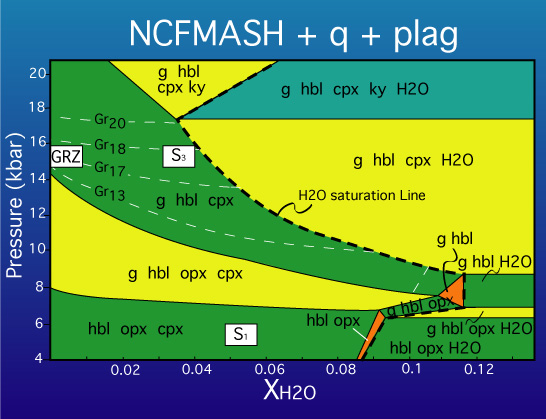Publications
° Clarke, G.L., Klepeis, K.A. and Daczko, N.R. 2000. Cretaceous granulites
at Milford Sound, New Zealand; their metamorphic history and emplacement
in a convergent margin setting. Journal of Metamorphic Geology, 18, 359-374.
Abstract
Granulite facies orthogneiss of the Arthur River Complex (ARC) at Milford
Sound, western Fiordland records a complex Early Cretaceous magmatic and
orogenic history for the Pacific Gondwana margin that culminated in the
emplacement and burial of a dioritic batholith, the Western Fiordland Orthogneiss
(WFO). Enstatite-bearing mafic to intermediate protoliths to the ARC and
WFO intruded the middle to upper crust. The early deformation history of
the ARC is preserved in the Pembroke Granulite, where two pyroxene S1
assemblages that reflect P<8 kbar and T>750°C were
only patchily recrystallized during later deformation. S1 is cut
by garnet-bearing, leucogabbroic to dioritic veins, which are cut by distinctive
D2 fractures involving anorthositic veins and garnet-diopside-plagioclase-bearing
reaction zones. These zones are widespread in the ARC and WFO and record
conditions of PÅ14 kbar and T>750°C. Garnet-clinopyroxene-bearing
corona reaction textures that mantle enstatite in both the ARC and WFO reflect
Early Cretaceous burial by more than 20 km of continental crust. Most of
the ARC is formed from the Milford and Harrison Gneisses, which contain steeply-dipping
S4 assemblages that envelop the Pembroke Granulite and involve
garnet, hornblende, diopside, clinozoisite, rutile and plagioclase with or
without kyanite. The P-T history of rocks in western Fiordland
reflect pronounced Early Cretaceous convergence-related tectonism and burial,
possibly related to the collision and accretion of island arc material onto
the Pacific Gondwana margin.

|
 ARC Centre of Excellence for Core to Crust Fluid Systems
ARC Centre of Excellence for Core to Crust Fluid Systems